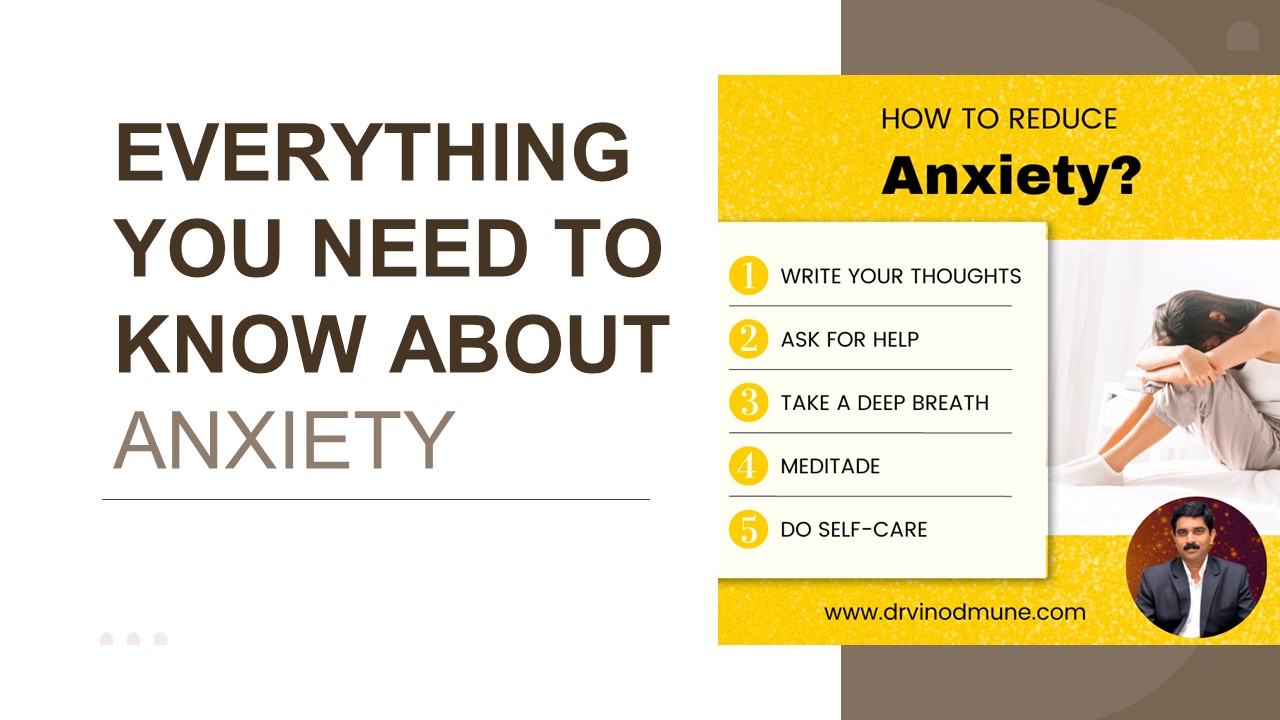EVERYTHING YOU NEED TO KNOW ABOUT ANXIETY - PowerPoint PPT Presentation
Title:
EVERYTHING YOU NEED TO KNOW ABOUT ANXIETY
Description:
An example of a mental health condition is anxiety disorders. It is difficult to get through your day when you are anxious. Feelings of anxiety, panic, and fear, as well as sweating and a rapid heartbeat, are symptoms. Medication, hypnotherapy and cognitive behavioral therapy are three options for treatment. The best treatment plan for you can be created by your healthcare provider. – PowerPoint PPT presentation
Number of Views:1
Title: EVERYTHING YOU NEED TO KNOW ABOUT ANXIETY
1
EVERYTHING YOU NEED TO KNOW ABOUT ANXIETY
2
Anxiety Disorders
An example of a mental health condition is
anxiety disorders. It is difficult to get through
your day when you are anxious. Feelings of
anxiety, panic, and fear, as well as sweating and
a rapid heartbeat, are symptoms. Medication,
hypnotherapy and cognitive behavioral therapy are
three options for treatment. The best treatment
plan for you can be created by your healthcare
provider.
3
What Is An Anxiety Disorder?
- As per to psychologist and hypnotherapist report
an umbrella term for a group of mental health
conditions characterized by extreme fear or worry
is anxiety disorder. Anxiety disorders are the
most common mental illness in the United States,
affecting 40 million adults aged 18 and older, or
18.1 of the population annually, according to
the Anxiety and Depression Association of America
(ADAA).1 The World Health Organization (WHO)
estimates that 1 in 13 people worldwide
experience anxiety. WHO reports that tension
problems are the most well-known mental issues
overall with a summed up uneasiness jumble
(Stray) besting the rundown followed by
unambiguous fear, significant burdensome issue,
and social phobia.² In this 2017 review,
scientists gauge that 792 million individuals
live with a psychological wellness problem
somewhat more than one of every 10 individuals
universally (10.7). - Anxiety disorders affected the most people, or
284 million people, which is a staggering 4
percent of the population.
4
What are the symptoms of anxiety?
Psychologist says the feeling of anxiety varies
from person to person. Feelings can range from
stomach butterflies to heart racing. You might
think there is disconnect between your mind and
body and that you are out of control. You might
be worried and afraid all over, or you might be
afraid of a specific place or thing. You may
experience a panic attack in some cases. Anxiety
symptoms from a trusted source can include
5
- Irritability
- Unexplained aches and pains
- Anxious thoughts or beliefs that is difficult to
control - Restlessness
- Trouble concentrating
- Difficulty falling asleep
- Fatigue
- It's possible that your anxiety symptoms are
different from those of others. Understanding the
various manifestations of anxiety is therefore
critical. Learn about the many different kinds of
symptoms that anxiety can cause.
6
How does medication treat anxiety disorders?
- Anxiety disorders cannot be treated with
medication. However, they can help you function
better and alleviate symptoms. Common medications
for anxiety disorders are - Your anxiety, panic, and worry may be reduced by
taking anti-anxiety medications like
benzodiazepines. They get the job done quickly,
but you can get used to them. As a result, over
time, they lose effectiveness. An anti-anxiety
medication may be prescribed by your psychologist
doctor for a short time and then tapered off, or
an antidepressant may be added to the mix.
7
Anxiety disorders may benefit from taking
antidepressants as well. They change how certain
chemicals are used by your brain to make you feel
better and less stressed. Be patient because it
may take some time for antidepressants to work.
Talk to your psychologist doctor first if you
think you're ready to stop taking
antidepressants. Some of the physical signs and
symptoms of anxiety disorders can be helped by
beta-blockers, which are typically prescribed for
high blood pressure. They can alleviate shaking,
trembling, and rapid heartbeat. Together with
you, your healthcare provider will determine the
best medication combination and dosage. Change
the dose only after consulting your psychologist.
They'll keep an eye on you to make sure the drugs
are working and don't cause side effects.
8
How does psychotherapy treat anxiety disorders?
- Counseling or psychotherapy can help you deal
with how you feel about the illness. Strategies
for better understanding and managing the
disorder are discussed by a mental health
professional psychologist. Some methods include - The most widely used form of psychotherapy for
anxiety disorders is cognitive behavioral therapy
(CBT). CBT for anxiety teaches you to identify
thought and behavior patterns that cause negative
emotions. After that, you alter them. - The goal of exposure therapy is to address the
anxiety disorder's underlying fears. It
encourages you to participate in activities or
situations you might have avoided. In addition to
exposure therapy, your provider may employ
imagery and relaxation techniques.
9
THANKS
- Do you have any questions?
- hhfnagpur_at_gmail.com
- 91 8483884908
- www.drvinodmune.com































